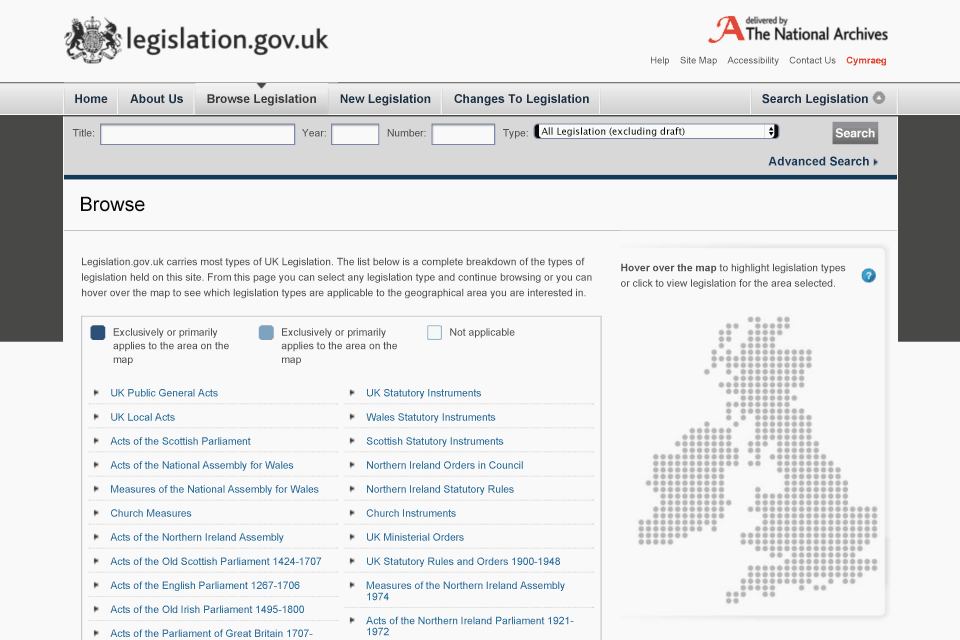Action 11 case study: build government as a platform
Published 24 March 2014
Government as a platform: The National Archives and O’Reilly Media
John Sheridan talks about the benefits of opening up government data using APIs
John Sheridan talks about the benefits of opening up government data using APIs
Even in this digital age, new government legislation is still published on sheets of vellum that are stored safely away inside the National Archives.
But another team at the National Archives is responsible for a world-leading project which uses an up-to-date publishing system to put all legislation online in a powerful, data-driven website: legislation.gov.uk.
John Sheridan leads this. His team had the challenge of building a publishing system for legislation, which is “very unusual content”. They’ve found a way to show legislation as a properly laid out legal document, and simultaneously to publish the meaning of that legislation as data that a computer can understand and interpret.
The whole site has been built using open standards. Everything that can be shared with the rest of the world, has been shared.

Screenshot of Legislation.gov.uk
All of the data we have can be used for free. All of our source code is available for free. We’ve used open standards for everything. We make it very easy to use the data in your own product or service.
That’s done using an API - a gateway that other services can use to connect directly to the legislative database and extract information from it. Rather than build a website and then try to plug a database into it, they worked the other way round. The data and the API came first, and the website was built on top.
That was the only feasible way of doing it, says John. “You simply could not write a specification for a system that is that difficult to build. If you did you would spend a year just writing the spec rather than a year writing code.”
The site is open to others to use, but benefits by providing a feedback loop. Third parties using the data, including legal reference information services such as Longman Law Bespoke and the Practical Law Company, are motivated to keep it up-to-date and accurate. With their help, updates and edits are made faster.
As a result, legislation.gov.uk is doing solving a problem that’s been troubling successive governments for over 100 years: it’s creating a fully up-to-date copy of the statute book.
John is confident that his team’s open-access, open-data model can be put to use in all sorts of areas.
By making our data open and making a mechanism for people to feedback and contribute, we’re able to create a new type of public good. If we can manage a database as complex as this one, we can do that with others.
John Sheridan is Head of Legislation Services at the National Archives.
Tim O’Reilly discusses open government data
Tim O’Reilly discusses open government data
According to Tim O’Reilly “government needs to start thinking about itself as a platform”. And Tim’s opinion matters, as the founder and CEO of O’Reilly Media - one of the world’s most respected computer book publishers.
Tim believes that government is right in wanting to create service end points that will allow outside developers to build applications against its data. Why?
Because it enables you build web services rather than just websites and apps, and when you publish those end points it enables people to use government data in a way that nobody expected.
For Tim, “that’s when you get that incredible revolution”.
He gives an example of how Apple rethought the mobile phone, with companies going from sitting down with a couple of developers and coming up with 30 applications for a phone, to Apple creating a platform which has resulted in more than 700,000 applications being created for the iPhone.
Tim believes that the real mark of success for government will be when government establishes the baseline set of things that it absolutely needs to do and then exposes a robust, rich set of service end points that will let people in the private sector add value to that minimal ‘must do’ set.
Then we can hit some real magic because we will get more and more services for citizens with more and more ingenuity, without any procurement at all because the government made it possible for people outside to build interesting things.
Tim finishes with an enlightening story that has stuck with him. It is an old story of the first 2 British shoe salesmen that went to Africa. The first thought there was no opportunity because nobody in Africa wore shoes. The second, however, wrote home saying ‘send more people, nobody wears shoes’! For Tim, the latter is the entrepreneurial attitude that the government should be, and is, adopting.
Tim O’Reilly is Founder and CEO of O’Reilly Media.
